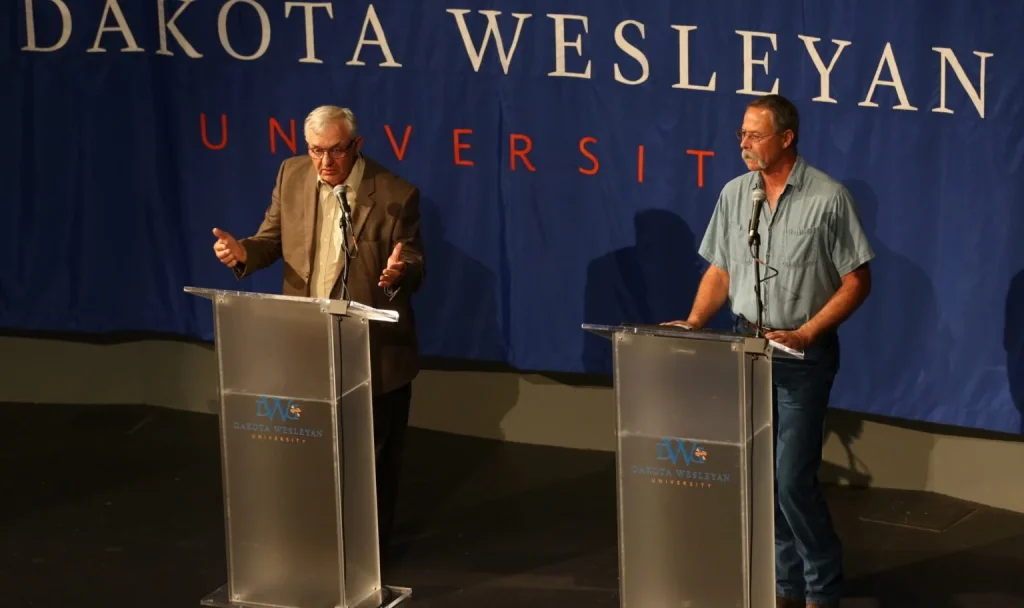One opposition committee relies on contributions from individuals and ag businesses; another receives money from national groups
PIERRE, S.D. – Money from ethanol producers is clashing with contributions from individuals and farm-and-ranch corporations — plus some funding from national climate activists — in the fight over a carbon-dioxide pipeline law on South Dakota’s Nov. 5 ballot.
Committees supporting the law have raised at least $2.3 million, all from ethanol companies, since their last reports in May, and they’ve spent $1.5 million. Committees opposing the law have raised at least $224,000 and spent over $160,000. Individuals and farm-and-ranch corporations put forth about $150,000 to defeat the bill, making up a majority of the money raised on the vote-no side.
The information comes from new campaign finance reports filed this week.
State lawmakers and Gov. Kristi Noem adopted Senate Bill 201 during the last legislative session. Opponents collected over 31,000 petition signatures to put the legislation on the ballot as Referred Law 21. A yes vote supports the law, while a no vote opposes it.
The law includes financial and other protections for landowners and counties affected by pipelines. It also shifts a burden to local governments, requiring them to prove their restrictions on pipelines are reasonable, instead of pipeline companies having to prove them unreasonable.
Proponent finances
A ballot question committee backing the law, Protect South Dakota’s Ag Future, is chaired by former South Dakota Agriculture Secretary Walt Bones. The committee spent $167,000 on advertising using a contribution of that amount from Gevo, a company that hopes to produce ethanol-based aviation fuel in South Dakota. Gevo is backing the law as part of its plans to use carbon capture technology in its production process.
Another ballot question committee, Vote Yes for a Strong South Dakota, raised $2.2 million from ethanol producers, including $1 million from POET, the Sioux Falls-based world’s largest ethanol company, and $400,000 from Glacial Lakes Energy, an ethanol producer with multiple locations in South Dakota. Another $200,000 came from Gevo. The committee has spent $1.4 million, mostly on ads.
Opponent finances
Opponents of the law, through the SD Property Rights and Local Control Alliance ballot question committee, raised $189,000. Aside from the individual donations and farm-and-ranch corporation contributions, an additional $27,500 was raised through fundraising events such as silent auctions.
South Dakota Searchlight questioned the committee’s treasurer, Rep. Tina Mulally, R-Rapid City, about the legality of reporting only the amount of the silent auction proceeds without the names of auction buyers. South Dakota requires individual campaign contributions above $100 to be disclosed with the contributor’s name.
“Those silent auctions were for a yard sign, a pie, a print,” Mulally said. “They were all little items. Mostly signs.”
Several county Republican parties donated a combined $4,400. South Dakotans for Safe and Responsible Renewable Energy is one of two political action committees listed as contributing, totaling $2,800; however, no committee by that name is listed on the state campaign finance website.
Jane Fonda and other national money
Another opponent group, a ballot question committee affiliated with Dakota Rural Action, received its $35,000 in funding from the South Dakota Rural Voters political action committee. It received its funding from two national groups – New World Foundation and Jane Fonda Climate PAC – which support social and climate justice efforts.
Referred Law 21 arose from controversy surrounding Iowa-based Summit Carbon Solutions, which has partnered with ethanol plants in the Midwest — including in eastern South Dakota — to capture CO2 and transport it to North Dakota for underground storage.
The project aims to benefit from federal tax credits for reducing greenhouse gas emissions. Some landowners along the route oppose the pipeline due to concerns about eminent domain — a legal process for gaining access to land from unwilling owners — and potentially hazardous leaks.
Referred Law 21, described as a compromise bill by Republican legislative leaders, does not address eminent domain but includes landowner protections. It requires pipeline companies to cover damages, mandates CO2 pipelines be buried at least 4 feet deep, and compels companies to share rupture modeling data. The law says counties can also collect up to $1 per linear foot of pipeline for property tax relief and road repairs.



